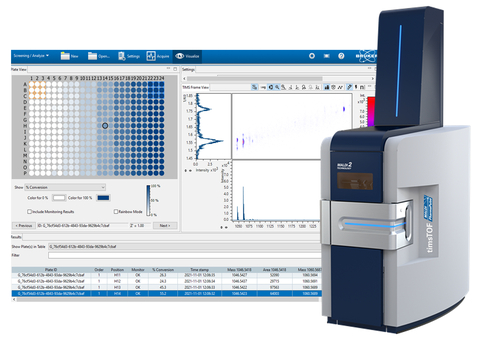BOSTON– At the SLAS2022 International Conference and Exhibition, Bruker Corporation (Nasdaq: BRKR) today announced the launch of its timsTOF MALDI PharmaPulse® (timsTOF MPP) system, a groundbreaking new high-end solution for unbiased, deep HTS and uHTS based on label-free mass spectrometry.
The new timsTOF® MPP is now the flagship of Bruker´s MALDI PharmaPulse product family which became a game changer in the HTS market with the launch of the rapifleX MPP, a MALDI-TOF-based label-free uHTS solution, in 2017.
The timsTOF MPP features the extreme speed and proven robustness of MALDI and, for the first time ever in HTS, takes advantage of Bruker´s innovative Trapped Ion Mobility Spectrometry (TIMS) technology. TIMS enables rapid gas-phase separation of isobars, and even isomers, by exploiting the molecular collisional cross-section. This, in combination with routine 50,000 mass resolution at full speed with QTOF-MS detection enables revolutionary levels of assay specificity at HTS speed.
The timsTOF MPP features a dual MALDI / ESI ion source with industry-leading 10 kHz smartbeam™ 3D laser to enable uHTS compatible speed and throughput, and is available with the unique MALDI-2 option for an expanded chemical space.
As part of the timsTOF MPP solution, the new MALDI PharmaPulse® 2023 software supports a broad range of HTS applications for drug discovery. Its automation interface allows for timsTOF MPP integration in high throughput environments and works in concert with common scheduling software packages from various vendors. Furthermore, MPP 2023 features seamless transfer of data and results to downstream analysis software, e.g., to Genedata Screener®.
Dr. Meike Hamester, Director of Label-free BioPharma Technologies at Bruker Daltonics, stated: “The timsTOF MPP is a major step towards higher efficiency in drug development as it reduces the need for orthogonal assays and technologies by its significantly higher HTS information content and, thus, further lowering of the false discovery rate (FDR). The high specificity of TIMS in combination with high resolution QTOF-MS detection is a great advantage for a broad variety of screening workflows such as binding assays, phenotype screening and biochemical and cell-based mechanistic assays. Furthermore, timsTOF MPP offers great potential for CCS-enabled near real-time synthesis screening in high-throughput experimentation (HTE) chemistry, paving the way to newly designed drug molecules. Bruker´s recently introduced laser based post-ionization technology (MALDI-2), can serve as a highly capable tool to expand the accessible analyte space adding to the versatility of this innovative platform.”


